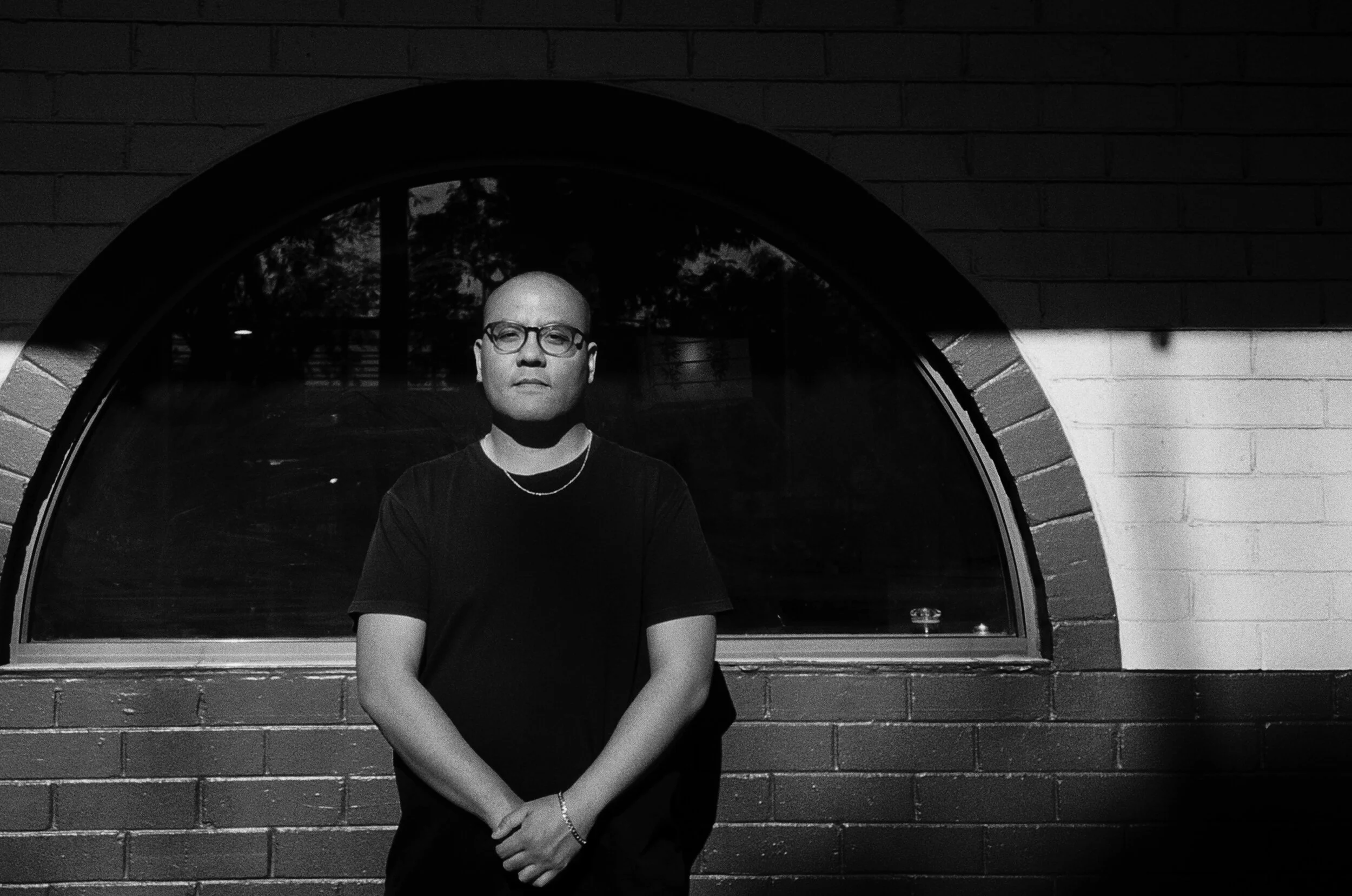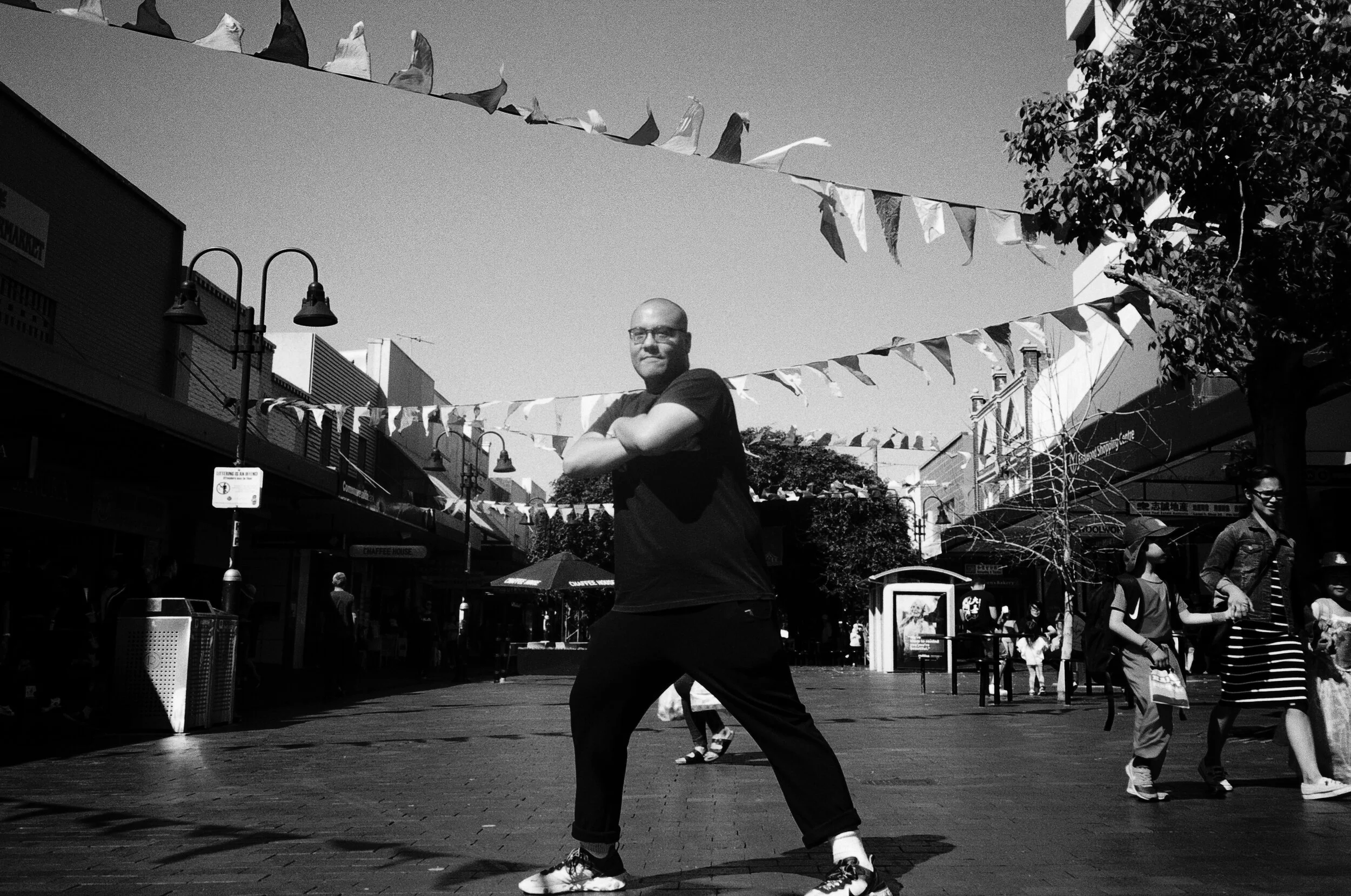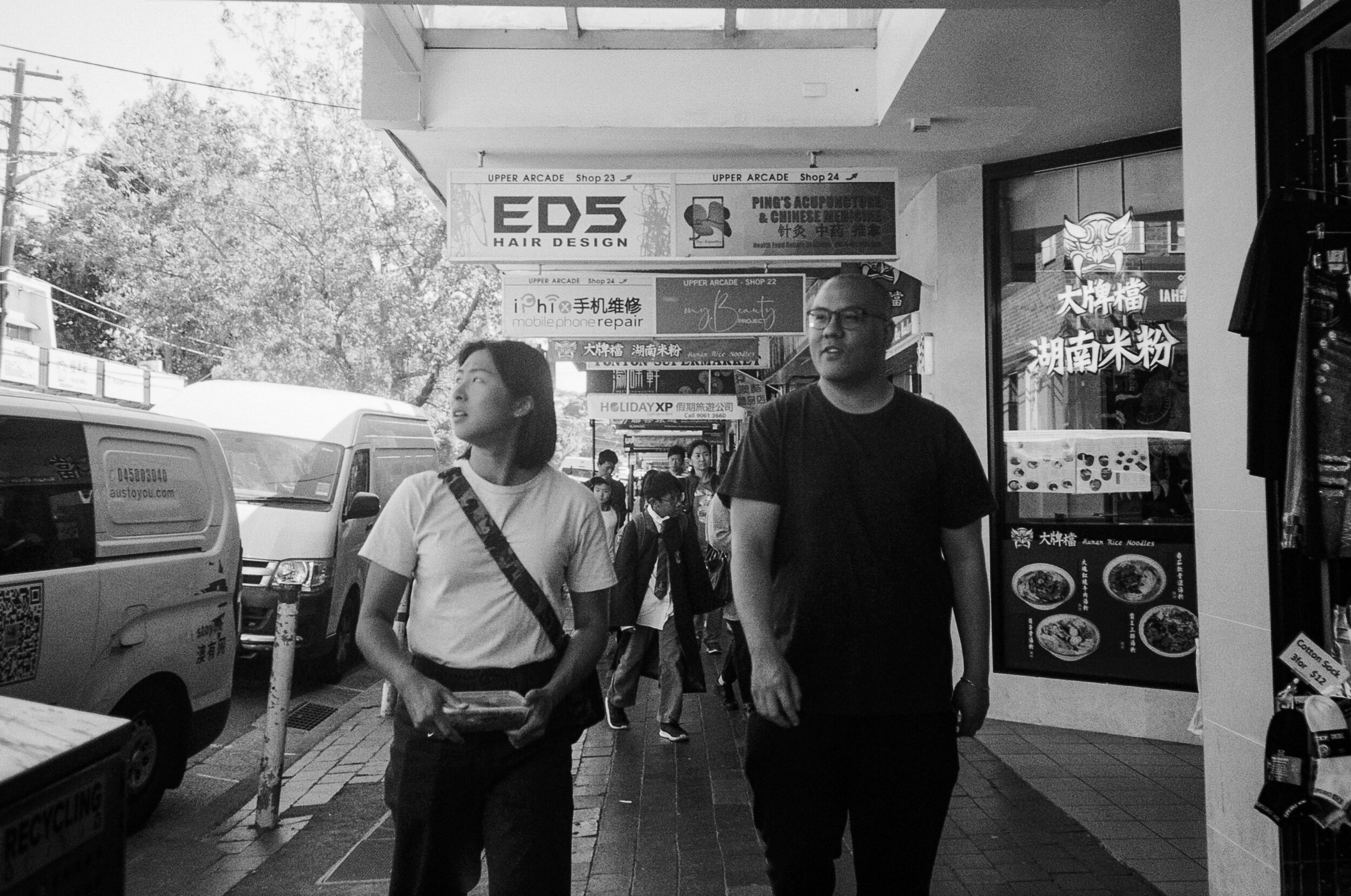Interview #129 — Andy Yee
by Louisa Luong
Andy Yee is a Sydney-based illustrator who works across diverse forms of media including illustration, video and podcasting. Yayaland is his newest series of drawings exploring a vibrant, humorous world teeming with collective conflict and anxiety.
While giving a tour of the suburb he grew up in Eastwood, Andy spoke to Louisa about telling the dark abstract stories in Yayaland, feeling more established and legitimate as an artist, and breaking the rules until the universe meets you halfway.
What’s the common thread between your expansive body of work including (but not limited to) illustrations, interviews, podcasts, writing, videos, and the occasional telenovela?
I think the common thread between those things is that it came from the fact that when I finished uni, I was so indecisive. When I was trying to put my CV together back then I would get paralysis from anxiety. I studied media and advertising so on paper I played it pretty safe and narrow. But also I'm a pretty safe and narrow person. It's just that I can turn it up, I can turn up the whacky. I can turn up the whacky, but generally, in real life I'm pretty conservative. I think anyway. So, I guess the common thread is that everything I’ve done is born from indecision and trying out stuff. Everything always comes back to the things I like: travel shows, art shows, articles, books. And illustrating too: illustrating has been the most common one but the other ones have definitely shaped me more in the last five years.
Despite new mediums and influences, what keeps bringing you back to drawing?
I've always done drawings since I was young, because it’s one of the few ways of expressing myself where I feel comfortable. Especially now that I've been doing it for a little while, I feel like I'm at a level of drawing where there's no embarrassment in showing people. I think there's always a level where there's a little modesty or shyness or embarrassment.
At the beginning, maybe a couple years ago, it was like that. But now it's to a point where I can say the things I want to say, and tell the kinds of abstract stories I want to tell, in a way that feels close to what's in my mind. It always so happens that when I imagine doing something as an art show or anything creative, I always imagine drawing first, and everything else after.
Why do you think you’ve become braver with showing your art and telling those stories?
I didn't realise until maybe five years ago that it's okay to do everything because when I was growing up, everyone did one thing and everything else is a hobby, or something you do for fun as a kid. You'd only be taken seriously for one thing, and also because I guess growing up and living with Chris, [Andy’s twin brother] and drawing with Chris, the bar was set pretty high. In my mind what I thought was illustrating or drawing was really high up there. I was like, I'm not up to that level.
So, Chris basically ruined your life…
Yeah, Chris basically ruined everything [laughs]. But honestly, that was never a conversation we had. And we don't know if we've really even had it now. That was something I put on myself. But I think I've done enough drawing shows now where I feel like it's on a level that stands on its own and the work reflects on me.
I didn't realise until maybe five years ago that it's okay to do everything because when I was growing up, everyone did one thing and everything else is a hobby, or something you do for fun as a kid.
Speaking of your work, can you tell me the story of your newest series, the chaotic, vibrant, violent world of Yayaland?
It originally started out as little characters that I drew for the 4A car boot sale. I've always wanted to do those Mickey Mouse kind of characters and do my own take on it. Yayaland is meant to be a really exaggerated, humorous but also a dark way of portraying how I use collective conflicts and anxiety. Everyone's still interacting in this big imagined world, which is reflective of how I view things in this world.
Did it take you long to build this world, or did you always have it in the back of your mind?
In terms of ideas for images, I always wanted to do my take on B-grade cartoons but it just never quite fit in before. That type of of imagery and cartoon characters with machine guns and lowriders — those were the kinds of images I grew up looking at. When I was drawing these cartoons I thought that this was the time to do those drawings because it matches with how I feel about things. But in terms of the actual world build, that happened piece by piece, and drawing by drawing. Once I get going, things become clearer and I find it hard to fully plan something. That's why I have to start, and the planning happens after but as long as I get an initial sketch on the foundation down.
Was there a mini story around each illustration?
Yeah, to a degree. If not a mini story, just a reference only I would get. Let's say the Chinatown scene... I wanted to bring up images of those 1960s movies — literally like the movie Chinatown [laughs]. Like those types of references and those types of scenes. It's not a clear cut narrative, but working those scenes and references into this bigger world, into this thing where they can all make sense in one thing.
Comics, manga and films have always been major influences in your work both visually and within narrative. What was the new ingredient you added in Yayaland, what distinguishes it from your previous collections?
There was definitely a big influence from Korean illustrators, there’s a collective called Quang Comics. They all do short form comics, and they’re doing everything really new and there aren’t any rules, and I like that. Before there were so many rules like if you're drawing skulls, you have to draw roses, and if you're drawing roses then it has to have typography. That sort of thing. Even stuff as detailed as proportions, I think all my other work tried to be more “proper” in that way.
You mentioned before that your influences were displaced (that it wasn’t meant for you, but you consumed it anyway). Can you talk a little more about this and how this has bled into Yayaland?
Being half-Fijian, half-Chinese and a pretty big guy. Being big and bald, there was definitely a thing where I literally didn't fit in a lot... out of place in general. Luckily through my family and friends, it never got me down, no one ever made me feel excluded. It's just how I felt sometimes. So I've always felt culturally dissonant from stuff even growing up, liking something like emo music was silly because no one looked like me.
When I was doing Yayaland and putting all these images on top of each other, it was more just doing it — and this is how I approach life to a degree — doing it and hoping it makes sense at the end. I try my best to make it make sense. All these different images and ideas seem cohesive in one thing, but if it doesn't, I guess that's your problem [laughs] because it's already been made.
Yayaland is meant to be a really exaggerated, humorous but also a dark way of portraying how I use collective conflicts and anxiety.
Was it hard for you to let go of Yayaland, just because it is quite dark and chaotic?
It was actually pretty easy because that's my reflex; my reaction is when it's done, it's done, so keeping it going was actually harder. Yeah when people met me at the show, they thought that I must’ve been some dark artist. But I'm like, thank you for coming, do you want a drink? You want a photo? You want one of the toys? Yeah I definitely felt like the show was the finish point, and everything past that is the DVD bonus stuff.
While your work is known for being colourful, funny and cynical, this is your most longform visual narrative to date. Why do you think it took so long for you to create such a focused series?
In the past I've been pretty stubborn. When I've gotten advice from Chris, James Jirat or any other bunch of amazing artists we have as friends, I would listen to maybe 30% of it and the other 70% would just hurt my feelings. One thing that everyone told me was that I need more follow through, because it's not just about making the work and exhibiting it, it's what happens after and how you give life to that work.
I’ve always done stuff to do it, put it out there, and then move on to the next one. When I was looking at all the drawings of Yayaland as a finished product, I thought that this could really be something, this could be something long-term that defines this period of my life.
And what do you think this period of time represents for you?
It has felt more established, I think people now recognise me for my work in general, as opposed to a guy that just does stuff, or just does drawings, or just does shows. It feels like things are opening up in the future where I could do more work. Where as before it was me having to force it, or push down that door myself. This feels more organic, more legitimate, more of how I think it's supposed to feel, as opposed to me banging on the door all the time, shouting, “I want to do this! I want to do that!” Even today when I interviewed a few wrestlers for Life Without Andy, it was WWE who hit me up. And I know for other people that might sound like a small thing, but for me, who's always tried to force things to happen, it's nice when the universe meets you halfway.
Why do you feel like you're always having to force your way?
It feels like a lot of things weren’t made for us. For example, an Asian illustrator back in the day had to be very chic, very proper, and the things they illustrated had to somehow always be connected to Asia. You had to be connected to these cultural stories. And there are a lot of artists like that that I really love. That being said, even in terms of podcasting, there weren’t a lot of podcasters that looked like me, that did things in a DIY kind of way. Maybe we didn't have the resources or didn't necessarily fit the part, so we had to force it if we wanted to do it. There was no one out there saying, “Hey, we're gonna do something different and give you a chance!”
Your work is centred around subversion and displacement, you’ve mentioned before that you try to do the wildest stuff possible simply because people don’t expect it from a guy like you. How do you keep this going in both your life and your art?
It is exhausting, but I find that the wilder the stuff you do, the more time you can take off. Like with Yayaland; with the toys, illustrations, and promo, I took an entire week took off just to consume stuff. I like to watch K-dramas, and I’m watching this show called Be Melodramatic. It's about these three women who are turning 30, and it's very similar to my life. They all work in different aspects of the entertainment industry and mind you, I didn’t know what the show was about when I started watching it. The show starts off with the lead character who writes a script called You're Turning 30 and It's Okay. I was like, who made this? It felt like one of those weird thrillers where I fell asleep, wrote the show and then when I woke up, the show was there. So I guess the way to keep it all going is to stop and talk to people, and consume stuff — that’s the way my mind’s always worked. And usually the ideas start coming again naturally.
Do you have any advice for emerging illustrators?
Don’t take any setbacks or perceived failures too personally. Just say to yourself, “It is what it is,” and keep it moving!
Who are you inspired by?
Chris Yee, James Jirat Patradoon, Brackmetal, Johanna Ng, Babekuhl, Stella Leuna, Freda Chiu, Victoria Garcia, Quang Comics, Sachiko Kazama, Yoshiharu Tsuge, and many more.
What are you listening to?
Hyukoh and Jacquees.
What are you reading?
I just finished this Korean graphic novel titled Bad Friends by Ancco and will hopefully start reading The Three-Body Problem soon-ish.
How do you practise self-care?
I try and squeeze in a little alone time whenever I can. I’ve recently picked up swimming again and it’s been a great away to be on my own and meditate on my thoughts.
What does being Asian-Australian mean to you?
It means that you will always possess a strong sense of belonging, while still feeling a little like you are on the outside looking in.
It feels like a lot of things weren’t made for us.
Andy walking with Louisa.
Find out more
Interview by Louisa Luong
Photographs by Kim Phan
Andy’s work has been previously featured on Spotlights, curated by Mike Eleven.




